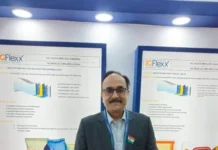
At the Indusfood Manufacturing show in Dwarka this January, Mamata Machinery, a leading Indian manufacturer of packaging machinery, featured live demonstrations of its horizontal form-fill-seal (HFFS), vertical form-fill-seal (VFFS), pick-fill-seal (PFS), and multi-lane sachet machines.
A major highlight was a live demonstration of its vertical form-fill-seal machine used to pack potato wafers. Speaking about the challenges of packing such products, Avinash Bangale, Mamata Machinery’s general manager of sales and marketing explained that potato wafers are particularly difficult to pack due to their very low bulk density and their tendency to float in the air as they fall into the packaging due to their shape.
Despite these challenges, Mamata’s machine efficiently packed the wafers at a speed of 130 packs per minute during the demo. The machine was shown running with packs made with a fully recyclable polypropylene (PP) film structure.
Another key focus of Mamata’s showcase was its horizontal form-fill-seal (HFFS) machine, which has been widely adopted by the Indian namkeen (salted snacks) industry. “This machine can produce stand-up pouches with or without a zip, making it highly versatile for snack packaging,” Bangale said. He said leading brands such as Haldiram’s, Balaji Wafers, and Kellogg’s are long-standing customers of this machine.
Discussing its capability to handle recyclable films, Bangale emphasized, “Our machines are compatible with a wide range of recyclable materials such as BOPP, CPP films, and coated paper. Whatever machines we manufacture, we aim to make them suitable for sustainable food packaging.”
Recyclability adoption challenges
At the same time, he acknowledged that adopting recyclable films in the food industry is still a challenge. “Even though our machines can handle recyclable films, some food brands are hesitant to use them because these films do not always offer the same barrier properties as traditional packaging,” he explained. Barrier properties are crucial in food packaging as they protect products from moisture, oxygen, and external contaminants, optimizing their shelf life.
Bangale noted that while there is still some reluctance in the industry, change is happening. “Technological advancements are arriving in both packaging machinery and film materials. We are seeing new developments that allow recyclable films to provide better protection and longer shelf life, which will encourage their wider adoption in the future,” he added.
For Bangale, the Indusfood exhibition was an opportunity to connect with international customers and explore new business opportunities. He said that as the food industry expands, the demand for advanced packaging machinery will also rise.










